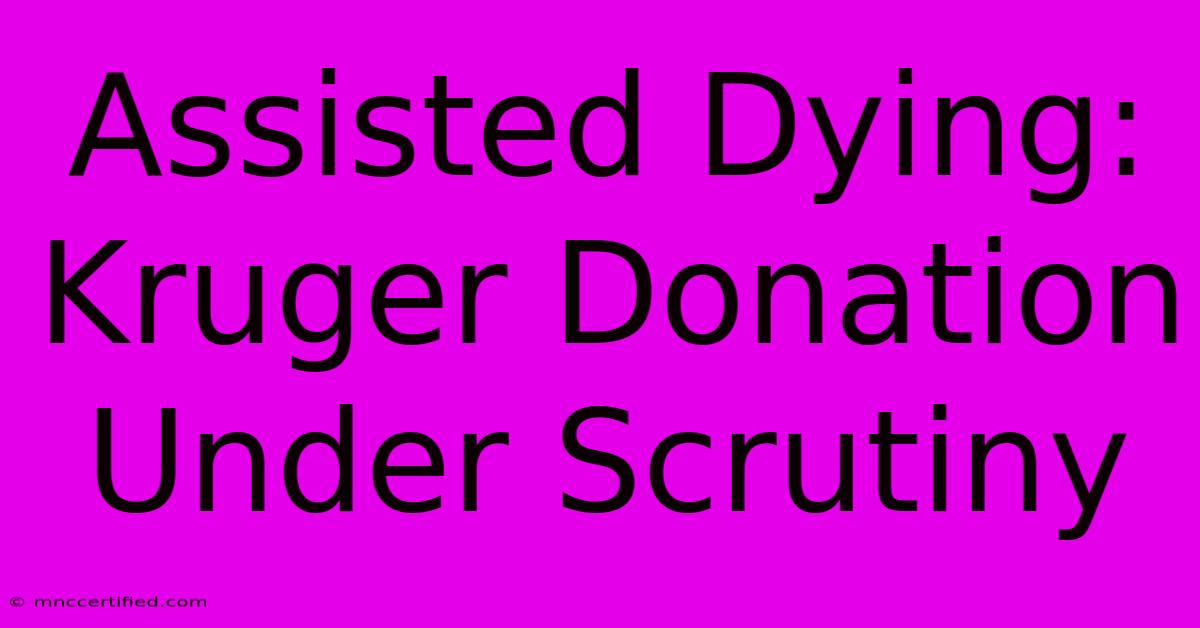Assisted Dying: Kruger Donation Under Scrutiny

Table of Contents
Assisted Dying: Kruger Donation Under Scrutiny
The recent donation by billionaire businessman, John Kruger, to the "Right to Choose" (RTC) campaign advocating for assisted dying legislation has ignited a firestorm of debate. While Kruger's contribution significantly bolsters the RTC's lobbying efforts, it's also drawn intense scrutiny, raising critical questions about transparency, influence, and the ethical implications of large-scale private donations in shaping public policy.
The Kruger Donation: A Game Changer for Assisted Dying Advocacy?
The exact amount of Kruger's donation remains undisclosed, shrouded in a veil of confidentiality often associated with such significant political contributions. However, sources close to the RTC suggest it represents a substantial portion of their current fundraising target, potentially catapulting their campaign to new heights. This influx of funding allows RTC to significantly expand its reach, employing strategies such as:
- Increased Public Awareness Campaigns: Expect a surge in targeted advertising, social media campaigns, and public relations efforts designed to sway public opinion in favor of assisted dying.
- Enhanced Lobbying Efforts: The donation will likely fund intensive lobbying activities, targeting key lawmakers and political parties to garner support for the proposed legislation.
- Expansion of Research and Advocacy Materials: More resources can be dedicated to producing and disseminating research supporting the assisted dying cause, as well as producing compelling advocacy materials for public consumption.
This strategic expansion raises concerns about the potential for undue influence. Critics argue that such large, opaque donations distort the democratic process, giving disproportionate weight to the views of wealthy individuals like Kruger.
Transparency and Accountability: The Core of the Debate
The lack of transparency surrounding Kruger's donation lies at the heart of the controversy. Many advocate for greater transparency in political donations, arguing that the public has a right to know who is funding campaigns that impact public policy. This is particularly crucial in sensitive areas like assisted dying, where ethical considerations and societal values are deeply intertwined.
Arguments for transparency include:
- Preventing Undue Influence: Open disclosure of donations helps prevent wealthy donors from wielding excessive influence on the legislative process.
- Promoting Accountability: Transparency holds donors and recipient organizations accountable for their actions and spending.
- Building Public Trust: Openness fosters public trust in the integrity of the democratic system.
Conversely, arguments against full disclosure often cite:
- Donor Privacy Concerns: Some argue that donors have a right to privacy and shouldn't be subjected to public scrutiny for their philanthropic contributions.
- Potential for Harassment: Public disclosure might expose donors to harassment or intimidation.
- Chilling Effect on Philanthropy: Fear of public scrutiny could discourage individuals from making charitable donations.
However, the balance between donor privacy and public accountability remains a crucial challenge. Finding a solution that addresses both concerns without undermining the integrity of the democratic process is paramount.
Ethical Considerations: Beyond the Dollars and Cents
Beyond the financial and political aspects, the debate also raises fundamental ethical questions surrounding assisted dying itself. The very nature of assisted dying elicits strong moral and religious objections from various segments of society. The Kruger donation, therefore, fuels this debate, adding a layer of complexity to an already contentious issue.
Key ethical considerations include:
- Vulnerable Populations: Concerns exist about the potential for coercion or exploitation of vulnerable individuals, particularly the elderly or those with disabilities.
- Slippery Slope Arguments: Critics worry that legalizing assisted dying could lead to a gradual expansion of its application, potentially endangering the lives of those who don't wish to die.
- The Role of Healthcare Professionals: Questions arise about the potential impact on the role and responsibilities of healthcare professionals, who may be ethically conflicted about participating in assisted dying procedures.
The Road Ahead: Navigating the Complexities
The Kruger donation to the RTC campaign highlights the complex interplay between money, politics, and ethics in shaping public policy on assisted dying. As the debate intensifies, it's crucial to engage in thoughtful, informed discussions that address both the practical and ethical implications of this crucial issue. Transparency, accountability, and a deep understanding of the various perspectives involved are vital for navigating the complexities and shaping a future where individual autonomy and societal well-being are both protected. Further investigation into the details of Kruger's donation and its impact on the RTC campaign will undoubtedly be crucial in shaping the public discourse on this important topic.

Thank you for visiting our website wich cover about Assisted Dying: Kruger Donation Under Scrutiny. We hope the information provided has been useful to you. Feel free to contact us if you have any questions or need further assistance. See you next time and dont miss to bookmark.
Featured Posts
-
What Is Tmj Zoe Balls Experience
Nov 29, 2024
-
Fifa Puskas Award 2024 Nominees
Nov 29, 2024
-
Haise On Rangers Health Scare
Nov 29, 2024
-
Alan Niese Fisher Investments
Nov 29, 2024
-
2 15 Health Insurance License
Nov 29, 2024